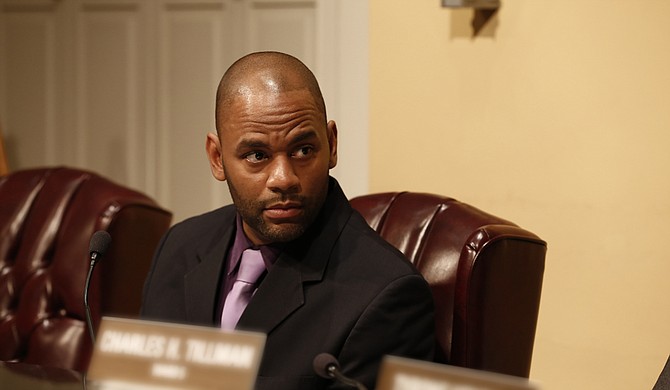Jackson officials such as City Council President De'Keither Stamps have argued that pulling out of Jackson's system would not only be a blow to the capital city's budget, but it would result in higher sewer bills for ratepayers on both sides of the river. Photo by Imani Khayyam.
The City of Jackson will ask state regulators for a formal evidentiary hearing to contest the approval of a wastewater treatment plant in west Rankin County.
Shelia Byrd, the spokeswoman for Mayor Tony Yarber, said the hearing is similar to a trial, where officials will testify about details of their plan.
On April 13, the Mississippi Department of Environmental Quality approved the permit application from the West Rankin Utility Authority to build a $125 million sewer-treatment plant on the banks of the Pearl River.
Currently, the authority pays Jackson in the ballpark of $5 million to treat wastewater from several Rankin County cities. Pulling out of Jackson's system would not only be a blow to the capital city's budget, but it would result in higher sewer bills for ratepayers on both sides of the river, officials with Jackson have argued.
"There are people on that side of the fence who say this is not a good idea either," City Council President De'Keither Stamps said. "Hopefully, cooler heads and lesser egos will prevail."
The Madison County Journal reported Wednesday that officials in Ridgeland, which is also a Jackson customer, fear that the loss of Rankin customers could mean higher bills for ratepayers in Madison.
Mike McCollum, Ridgeland's public works director, told the Journal: "A lot of people really aren't sure because Jackson is going through this consent decree with the EPA and we don't know if West Rankin is going to be liable for any repairs going forward even if they construct their own." Some of Jackson's municipal customers have long complained that the city's Savanna Street waste-treatment plant is not up to current United States Environmental Protection Agency standards, that Jackson puts off needed maintenance, that sewer-treatment rates have risen significantly, and that the city has failed to maintain customer service and communication with clients. In 2011, the WRUA applied for a permit to build its own plant.
At a permit hearing in February, attorneys for Jackson argued that another wastewater plant on the Pearl River would be tantamount to "deregionalization" when federal environmental agencies require regions to consolidate resources as much as possible. Jackson also claims that the WRUA plan would violate U.S. EPA regulations for clean water and total maximum daily load allocations for nitrogen and phosphorous.
Keith Turner, an attorney for WRUA, said his clients expected that Jackson would seek an evidentiary hearing and feel confident that they will prevail. Turner added that the hearing would also shed more light on cost forecasts from both Jackson and WRUA, which has become one of the main sticking points. WRUA is skeptical of Jackson's claims of how much it will cost to upgrade the Savanna Street plant, which vacillated between $125 million and, as of Monday's MDEQ meeting, $250 million, Turner said.
From Jackson's view, WRUA lowballed the price tag for the new facility at $125 million. Jackson thinks the plant will cost more than $3 million more.
The hearing would take place in September at the earliest.



Comments
Use the comment form below to begin a discussion about this content.